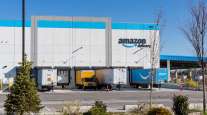Perspective: To Compete, Shippers Must Invest in Smart Technologies
The business of package delivery is rapidly evolving to adapt to changes in consumers’ behavior and expectations. For those consumers, it’s no longer just about delivering the right product — it’s about the perceived quality of the delivery service. To compete, shippers must provide the best customer experience possible by investing in smart technologies and selecting the right delivery model.

Outman
Some of the significant trends and factors shaping package transportation today and in the future include the following:
Automated Logistics: Online retailers are experimenting with “smart” parcel lockers in which final delivery by a courier is replaced by self-pickup by the consumer. Powered by the internet of things, encryption and cloud-computing technologies, people can pick up their packages 24-7 from smart lockers by scanning their fingerprints or using individual access codes sent to their mobile devices. Smart lockers are ideal for high-density cities with high foot-traffic and centralized public locations, such as retail stores and subway terminals.
Address Intelligence: Failed deliveries continue to generate extra costs, miles and emissions for motor carriers. According to a study commissioned by Loqate in 2017, the cost of failed deliveries for U.S. retailers was put at an average of $216,171 per year.
One way carriers can limit failed deliveries and increase last-mile efficiency is through address intelligence: getting real-time delivery information from customers and using it to adjust the delivery process. In essence, shippers enter a conversation with the recipient ahead of time (as early as placing the order) to determine ideal or preferred delivery location, time and safety requirements. Accurate data helps carriers decrease empty runs and deploy alternative options: leave the package with a neighbor, at a pick-up terminal or in a locker.
Clean Air Zones: According to the U.S. Environmental Protection Agency, the transportation sector accounts for the largest portion of total U.S. greenhouse gas emissions at 28%, and the medium and heavy-duty truck sector accounts for 23% of those emissions. As a result, cities are introducing clean air zones.
A clean air zone is an area where a local authority has adopted measures to improve air quality by discouraging vehicles that contribute to pollution levels from entering the zone. These types of initiatives directly affect freight transportation, as they compel carriers to expand the number of lower-emission vehicles in their fleets.
Robotic Supply Chains: While development of autonomous delivery robots such as drones continues, regulatory challenges and privacy concerns remain an issue. With the driver shortage and ever-changing labor market conditions, carriers may invest in autonomous robots to move parcels and goods quickly, and reduce operating costs associated with human intervention. But to convince authorities to adjust legislation and strengthen the case for the safety of autonomous robots, carriers must conduct more trials. If those trials prove successful, we also may see retailers invest in or acquire start-ups that develop this type of technology.
Another area that could be revolutionized by robots is warehousing. In a bid to reduce costs and ensure fast delivery, robots could operate micro-fulfillment centers and fulfill online orders.
Sharing Economy: We’re witnessing a societal shift from ownership to asset sharing, which presents shippers with the opportunity to reduce delivery costs. As people have become comfortable with the sharing model, shippers are turning to crowdsourced delivery for last-mile delivery. With the goal of getting orders to the customers quicker, businesses start to rely more on on-demand fulfillment, mirroring the Uber model, and tapping into a network of drivers to handle the last leg of shipping.
Still, trust can be an issue in the shared economy, so shippers can help prevent items from being tampered with by using specialized bags that have automatic locks and interior sensors to monitor weight, humidity, shock and temperature.
Ultimately, smart shippers must abandon traditional delivery approaches with the help of technology and new delivery models.
Trevor Outman is co-founder and president of Shipware, which provides intelligent distribution services for volume parcel and LTL shippers.



